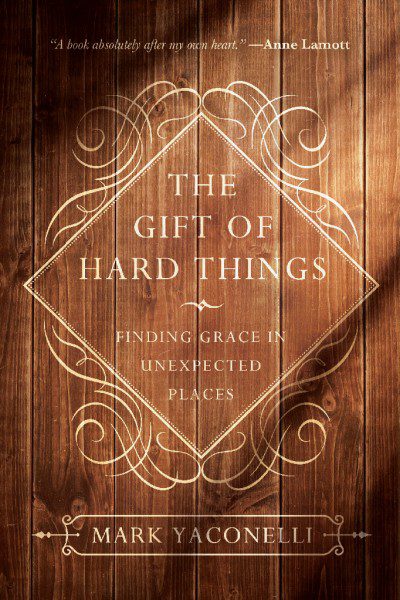New life goal: write a book that gets the resounding endorsement of Anne Lamott.
Of course, in my real life, this will probably never happen. But for Mark Yaconelli, it is happening. Because he’s Mark Yaconelli. And when your new book has the resounding endorsement of Anne Lamott on the cover–in print, even–then you probably don’t need a few paragraphs from a two bit blogger (me). But, “The Gift of Hard Things” is a Patheos Book Club choice this month, so a few paragraphs from me is what you get anyway.
I can see why Anne Herself is crazy about this new offering from a trusted voice in the world of Christian spirituality. It is wonderfully narrative and extremely readable; it is lyrical and rhythmic at times, but also razor sharp and challenging. It cuts to the heart of the everyday disappointments, big and small, that pain each of us; and extends an invitation to reframe and retell those stories in a way that is redemptive.
In short, accessible chapters, Yaconelli explores many of life’s difficult places–burnout, disappointment, anger, loss, etc–through powerful storytelling. He then shares some questions for personal reflection, followed by some concise and attainable action items in the form of spiritual practice.

Those questions and suggested practices mean that you could read this book in a couple of different ways: if you are, for instance, reading it to review for a blog post or use in a sermon series, you might sit down and read the whole thing in an hour or two. It is certainly engaging and short enough that you could. Fair warning though–do not try to read it in Panera while you eat your lunch, because you MAY OR MAY NOT find yourself crying into your Greek salad somewhere around chapters 4 & 5. Not that I’d know.
Or you could take a lingering approach–read this book one chapter at a time in a discipline of morning or evening devotion. In fact–if you were to properly explore each question and practice as the author has laid out, you could easily spend a week on each chapter, using this book as a reflective guide to journey over a season. The format also makes the book user-friendly for small groups or book clubs. While some of the questions are the searching sort that could make for difficult sharing, it could be very meaningful work for a faith community to explore together.
However you choose to use this book, it’s a good one, for any season. The author moves us through some of the privileged assumptions that can lead to great heartbreak, and offers a way forward from disappointment to a renewed sense of freedom. Here is a most illuminating passage, from the introduction:
As a white, middle-class Westerner, I have been taught that the pursuit and realization of my individual desires and appetites are my birthright. I have been taught that with discipline, planning and hard work, life will conform to my expectations. Our society doesn’t tolerate the idea that we lack control. Even in our spiritual lives we hold up teachers, books and spiritual practices that promise happiness, peace and health. And yet is there anything more destructive than human beings who believe they have life under control? Under this illusion we assume our every fortune is earned and every suffering deserved. How isolating.
Other new life goal: write a book that receives the resounding endorsement of Mark Yaconelli.
Hey, a girl can dream…












